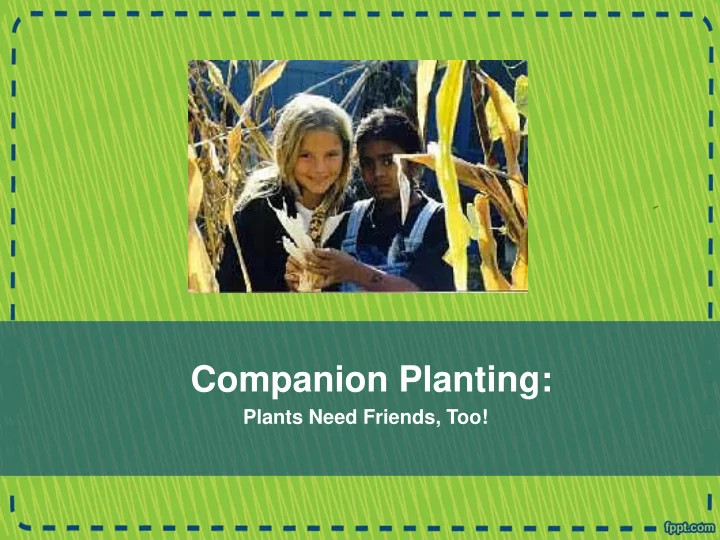

Companion Planting: Plants Need Friends, Too!
What is Companion Planting? • Planting two or more plant species in close proximity to culturally benefit each other by attracting or deterring pests, keeping the soil healthy, and improving flavor. • It takes more than good soil, sun, and nutrients to ensure success in your garden. Plants have to grow well with one another.
Companion Planting Around the World • Has been~~and is~~a gardening practice in many cultures where societies observed the relationships between various plants and used them as a guide for successful growing.
One Culture’s Story: Native America
• Planted for centuries by traditional Native The Three American gardeners, Sisters’ Legend who believed the three sisters~~squash, beans, and corn~~ should never be separated.
The Three Sisters’ Garden • The Eldest Sister: Corn • The Bountiful Sister: Beans • The Protecting Sister: Squash
Considerations In Companion Selections • Aboveground Needs: Beneficial Insects Pollinators Deters Pests Prevents Disease Supports Plant Structure Ornamental Properties Trap Crop (Sacrificial crop whose primary purpose is to lure pests away) Shelter Crop (Helps protect main crop from the elements)
• Belowground Needs: Supplies Nutrients Deters Soil Pests Catch Crops Suppresses Weeds Improves Flavor Health Improvement Soil Improver Yield Improver
A Few Aboveground Combinations to Try: Trap Plants — lure insects to themselves Nasturtiums are LOVED by aphids so much that they (the aphids) will flock to them, helping to protect whatever crop to which the nasturtiums are closely planted
Repel Pests--- Marigolds work with just about any garden plant. They repel beetles, nematodes, and even some animal pests like deer and rabbits.
Attracts Beneficial Insects--- Borage (Starflower) is one of THE BEST bee- and wasp-attracting plants. It is great for tomatoes, squash, strawberries, and many others. It also deters tomato hornworms and cabbage worms.
Attracts Beneficial Insects and Other Pollinators--- With any plants: Monarda (Bee Balm)
Carrots , Dill , Parsley , and Parsnip attract ladybugs, spiders, and praying mantises which will eat insect pests
• Shelter Crop--- Leafy greens like Spinach and Swiss Chard grow well in the shadow of Corn Sunflowers do well in the spotty shade of Corn and do not compete for nutrients and water because their roots are at different levels in the soil
A Few Belowground Combinations to Try: Supplies Nutrients--- Legumes and some trees (like alders) have symbiotic relationships with bacteria in the soil that help them to capture nitrogen from the air and convert it to fertilizer that enriches the soil.
• Deters Soil Pests--- *Some plants, especially herbs, act as underground repellants, confusing pests with their strong odors by masking the scent of the host plants. *Dill and Basil protect tomatoes from hornworms *Sage reduces injury to cabbage by cabbage worms.
Flavor Improver--- Bee Balm (Monarda, Oswego) improves the flavor and growth of tomatoes . Celery, onions, and potatoes improve broccoli’s flavor.
Soil Improver--- Blueberries , azaleas , mountain laurel , and other ericaceous (Heath Family) plants thrive in acidic soils created by pines and oaks. Beets add minerals to soil. Leaves are made up of 25% magnesium and are a great addition to your compost pile if you don’t care to eat them!
Combatants • Some plants are Incompatible, or “Combatants” • Some “Do Not’s” White garlic and onions make great neighbors for most garden plants because they REPEL all kinds of pests, but they STUNT the growth of beans and peas
Examples of Combatants – Potatoes and beans do not work well with sunflowers -- Cabbage does not work well with cauliflower -- Broccoli should not be planted close to rue, grapes, strawberries, and mustards
• Because of the anecdotal nature of Companion Planting, the “Why’s” are not always readily available or apparent. Sources, to name a few: Josie Jeffery’s “ The Mix & Match Guide to Companion Planting: An Easy, Organic Way to Deter Pests, Prevent Disease, Improve Flavor, and Increase Yields in Your Vegetable Garden”
Dale Mayer’s “ The Complete Guide to Companion Planting: Everything you need to know to make your garden successful” ~~~~~~~~~~~~~~~~~~~~~~~~~~~~~~~~~~~~~ Sally Jean Cunningham’s Great Garden Companions : A Companion Planting System for a Beautiful, Chemical-free Vegetable Garden
Recommend
More recommend